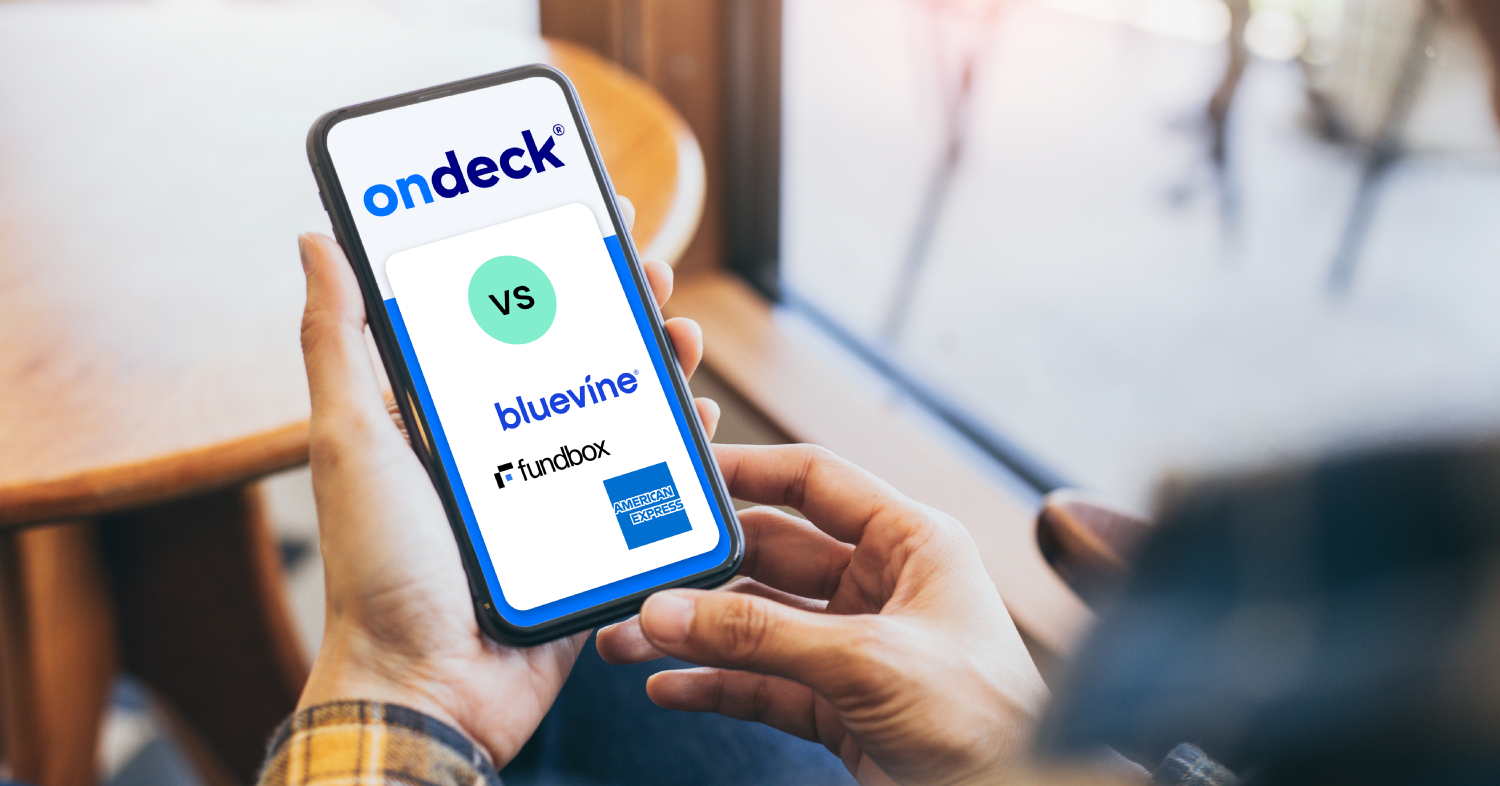Business Credit vs. Personal Credit — What’s the Difference?
As a small business owner, understanding the difference between your personal credit score and your business credit score is important. Both these numbers can impact you and your business’s finances.
Learning how each score works, where to use them and why they’re important can help you grow your business to new heights and keep your personal finances on track.
What’s the difference between business credit and personal credit?
The main difference between business and personal credit (also known as consumer credit) is that business credit reflects how your company manages debt and finances, while personal credit measures your individual financial behavior. Each is tracked separately and used for different types of borrowing.
Here’s how they compare:
| Factor | Business Credit | Personal Credit |
| Who it’s tied to | Your business entity | You as an individual |
| Credit bureaus | Dun & Bradstreet, Experian Business, Equifax Business | Experian, Equifax, TransUnion |
| What it tracks | Business loans, business credit cards, business lines of credit, vendor accounts, payment history | Personal credit cards, mortgages, personal loans |
| Score range | Typically 0 – 100 | Typically 300 – 850 |
| Reporting behavior | Some lenders or vendors may only report to bureaus if requested | Lenders and creditors regularly report to credit bureaus |
| Usage | Used for business financing, trade credit, leasing | Used for mortgages, credit cards, auto loans, etc. |
| Liability | Generally limited to the business | Borrower is personally liable |
| How to check your score | You can check your business credit score through OnDeck for free, and check your business credit reports through each of the major business credit bureaus. | You can get a free copy of your personal credit report every 12 months, or use sites like Credit Karma to check more frequently. |
What is business credit?
Business credit refers to a track record of a business’s ability to borrow and repay money. It’s separate from your personal credit and is based on your company’s financial activity — like paying bills on time, managing debt and maintaining consistent revenue.
Over time, lenders and credit bureaus use this information to assign your business a credit score. That score helps lenders decide whether to approve you for financing — and what terms to offer. It can also affect your insurance premiums and vendor agreements.
The stronger your business credit, the more financing options you may have access to — and the more negotiating power you’ll have when it comes to interest rates and repayment terms.
Does personal credit affect business credit?
Yes, personal credit can significantly affect business credit, particularly for small businesses and startups. Some business credit scores, including the FICO® Small Business Scoring Service, take your personal credit into consideration. Additionally, when a new business lacks substantial credit history, lenders often rely on the owner’s personal credit score to assess the business’s creditworthiness.
Here’s how personal credit may impact a business owner:
Loan approvals. Lenders typically review the personal credit history of business owners when evaluating business loan applications. A strong personal credit score can increase the chances of loan approval, potentially providing access to larger loan amounts and more favorable terms. Conversely, a poor personal credit score can lead to higher interest rates, stricter repayment terms, or even loan denial.
Credit card applications. Business credit card issuers frequently check the personal credit of the business owner. A solid personal credit history can lead to better terms, including higher credit limits, lower interest rates and access to premium rewards programs. On the other hand, a lower personal credit score (“bad credit”) may result in limited credit options and higher costs.
Vendor relationships. Suppliers and vendors often assess personal credit scores when extending credit terms to new businesses. A positive personal credit history can help establish trust and lead to favorable payment terms, such as longer payment cycles and larger credit lines. This can be crucial for managing cash flow and maintaining supplier partnerships.
Building business credit. In the early stages, personal credit can act as a foundation for building business credit. Responsible use of personal credit, such as a timely payment history and low credit utilization, can pave the way for the business to establish its own credit profile over time. As the business builds its credit history, it becomes less reliant on the owner’s personal credit.
Personal guarantees. Lenders often require a personal guarantee from the business owner, especially when the business lacks an established credit history. A personal guarantee means the owner is personally liable for the business debt, directly linking personal credit to business obligations. This underscores the importance of maintaining good personal credit, as any negative impact on personal credit can affect the ability to secure business financing.
Interest rates and terms. Both personal and business credit scores can influence the interest rates and terms offered by lenders. A strong personal credit score, combined with good business credit, can lead to lower interest rates and more favorable terms, reducing the overall cost of borrowing and improving the business’s financial health.
Maintaining a strong personal credit score is crucial for small business owners seeking to secure financing and favorable credit terms for their businesses. Over time, as the business establishes its own credit history, it will become more independent from the owner’s personal finances, but initially, personal credit plays a critical role in the business’s financial success.
What are the different scoring models for business credit?
There are four primary business credit bureaus: Experian, Equifax, FICO®, and Dun & Bradstreet. Each bureau has its own scoring system, so scores can vary. A strong business credit score is typically in the top 20% of the scoring range.
Experian Intelliscore. Experian offers Intelliscore Plus and Intelliscore Plus v2, both using a scale from 1 to 100. Scores of 80 and above are most favorable. Personal credit may impact Intelliscore Plus, especially for newer businesses.
Equifax. Equifax provides the Business Credit Risk Score (101 to 992) and the Business Failure Score (1,000 to 1,610). Both consider business credit factors like bankruptcies, liens, judgments, payment histories and credit inquiries. Equifax business credit scores do not directly take personal credit history into account.
FICO® Small Business Scoring Service (SBSS). The FICO® Small Business Score℠ ranges from 0 to 300 and includes both personal and business credit information. This score is used by lenders for SBA loans, requiring a minimum score of 155.
Dun & Bradstreet’s PAYDEX® Score. This score, ranging from 0 to 100, is based on payment timeliness to creditors. Payments overdue by 31 to 90 days will affect your score more than those overdue by 15 to 30 days. Personal credit is not a factor in this scoring model.
Why is business credit important?
Business credit demonstrates the financial health and responsibility of your business, which is important for a number of reasons.
Protect your personal credit. Maintaining a distinction between your personal finances and your business finances can help you protect your personal credit. Running a business has its ups and downs. If your business is facing hard times, you can keep your personal credit score protected.
Get access to business funding. Your business credit score is a measure of your business’s creditworthiness. Some lenders and credit card issuers may consider both your personal credit and your business credit, but having a strong business credit score can help you get lower interest rates, higher credit limits and better terms.
Improve your relationships with your vendors. With a good business credit score, vendors and other suppliers may be more willing to extend credit or payment plans. This can help you better manage your cash flow and inventory.
Find better business opportunities. Partners and investors may be more inclined to work with businesses that have a good business credit score. A good score can instill confidence in the stability of your business. Plus, business credit scores are a transferable asset. If you ever sell your business, a good score can help raise the value.
Can I build business credit if I don’t have good personal credit?
Yes, you can build business credit even if you have bad personal credit. However, it can be a little more difficult since some business credit scores take personal credit into consideration.
Furthermore, if a business hasn’t established a business credit profile and built sufficient business credit, lenders may look at the business owner’s personal credit.
Maintaining healthy business credit habits, such as separating personal and business finances, timely payments, and responsible credit use can help you build your business credit score over time. Even if your personal credit is less-than-perfect, you can lay a solid foundation for a strong business credit profile, enabling better financing opportunities and terms in the future.
How do you establish business credit?
In order to start establishing business credit, there are a few steps you could take.
Get an Employer Identification Number (EIN). An EIN is a number the government assigns to your business for tax purposes. You can apply for an EIN online. Just like your personal credit score is linked to you by your social security number, your business credit score is linked to your business by its EIN.
Open a business credit profile. In order to have a business credit profile your business needs to have things like an EIN and a business bank account. For some of the bureaus, such as Dun & Bradstreet, you may also need to register your business. You can apply for a free DUNS number to ensure you’re registered.
Apply for and utilize business credit. Consider opening credit accounts or tradelines in your business’s name, and use the accounts for business expenses. Be sure that the vendor or lender reports to the major business credit bureaus.
How do you build business credit history?
Once your business credit profile is established, building it takes consistency — much like building personal credit. But there are a few key differences.
Here’s how to build business credit over time:
Borrow in your business’s name. Use business credit cards, lines of credit or vendor accounts tied to your EIN — not your Social Security number (SSN).
Work with creditors that report. Unlike personal lenders, not all business creditors report to bureaus. Choose vendors and lenders who do — and confirm it.
Pay early or on time. On-time payments help with both personal and business credit, but with business credit, early payments can strengthen your score.
Watch your credit utilization. Just like personal credit, keeping balances low relative to your limit can improve your score.
Monitor your reports. Regularly check your business credit with Dun & Bradstreet, Experian Business or Equifax Business to correct any errors.
Business credit history rewards consistent, responsible use. And unlike personal credit, strong business credit can help you qualify for financing without a personal guarantee over time.
A word from the experts: why building strong business credit matters.
Key differences and importance.
“While both personal credit and business credit have a similar function of helping determine financial health, the way they are leveraged and how they are perceived by lenders could be fundamentally different. Personal credit is inextricably linked to you as an individual, reflecting your personal history with private debts and loans. In contrast, business credit is tied to the business entity, and is tracked separately. This critical separation not only protects you as an individual, it underscores the importance of building your business credit.
“Tied to Entity vs. Individual: Personal credit is tied to your Social Security Number (SSN), while business credit is tied to your business’s EIN.
“Distinct Tracking: Personal credit reflects consumer debts (mortgages and credit cards), whereas business credit tracks performance on commercial accounts, business loans, vendor credit, and more.
“Personal Protection: Building strong business credit is essential because it helps protect your personal assets and credit standing by separating business liabilities from your private finances.”
David Adams, Head of Commercial Product Marketing
DISCLAIMER: This content is for informational purposes only, and is not intended as financial, investment or legal advice.
Article Contributors

David Adams, Head of Commercial Product Marketing
David Adams is the Head of Product Marketing for the Commercial line of business at Equifax, a global data, analytics, and technology company. With over two decades of technology experience, David brings a data-driven approach to market strategy, specializing in high-growth business segments. David’s career has been marked by a strong focus on the financial services sector, where his six years of dedicated experience in business credit have provided him with a deep understanding of the challenges and opportunities in commercial lending and risk management.



